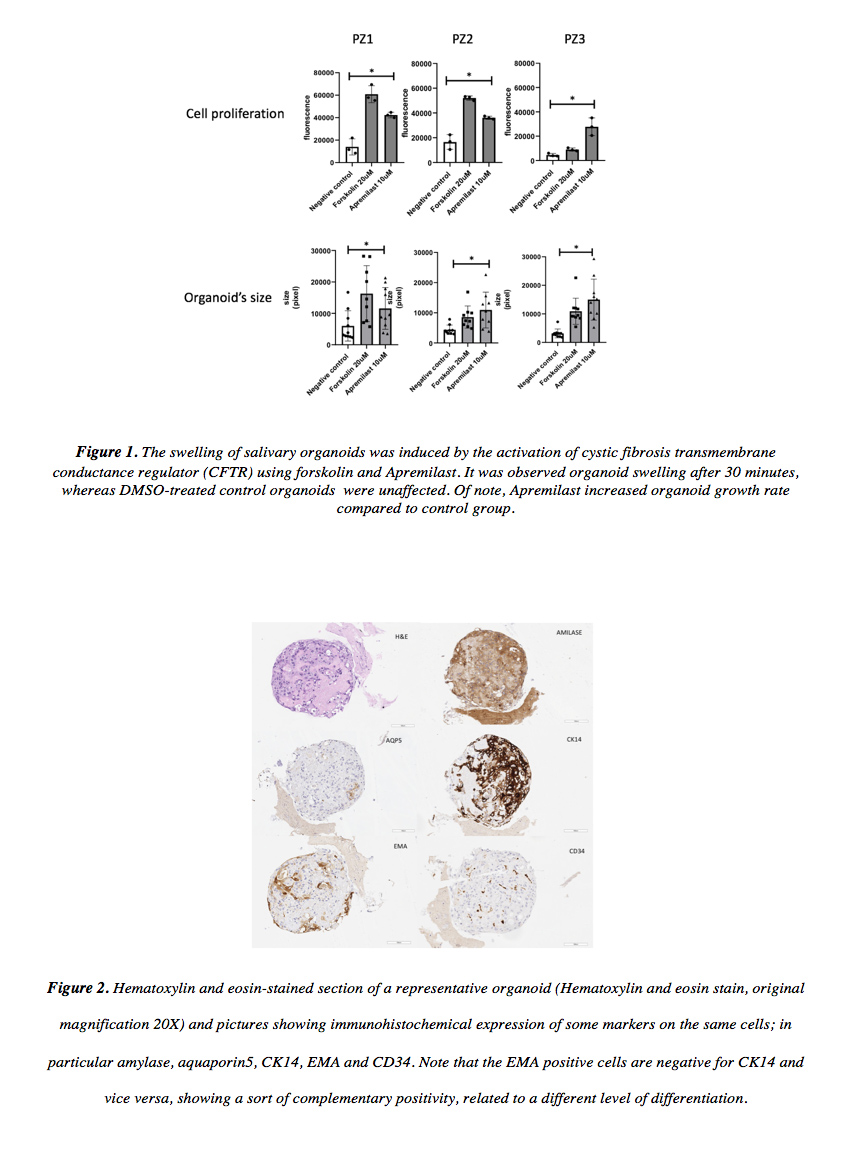Session Information
Date: Tuesday, November 14, 2023
Title: (2177–2194) Sjögren’s Syndrome – Basic & Clinical Science Poster II
Session Type: Poster Session C
Session Time: 9:00AM-11:00AM
Background/Purpose: In primary Sjögren’s syndrome (pSS), salivary epithelial cells show an active role in the initiation and reiteration of the immunomediated damage. Epithelial saliva production is regulated by autonomic stimuli, intracellular calcium and cAMP concentration. The latter controls the action of cystic fibrosis transmembrane conductance regulator (CFTR), whose malfunction is postulated in sicca syndrome and pSS pathogenesis. (1) Forskolin is an activator of CFTR used in organoid swelling test in human salivary-gland derived organoid culture systems. Interestingly, also PDE4 is involved in intracellular cAMP deregulation: PDE4 inhibition might thus stimulate salivary function in pSS. (2-3) To the best of our knowledge, no data on the application of human salivary gland organoids specifically for testing drugs effective on xerostomia in pSS are found in literature. The objectives of this study are: to culture vital salivary gland organoids obtained through labial or parotid biopsy of pSS patients; to evaluate the morphological structure and functional capacity of organoids in basal condition and after stimulation with forskolin and PDE4 inhibitor apremilast.
Methods: Salivary gland tissues were harvested from 5 pSS patients through labial or parotid biopsy. After tissue processation and vital organoids obtainment, swelling essay and cell proliferation tests were performed after forskolin and apremilast application, compared to DMSO-treated controls. Immunohistochemistry evaluation on original salivary gland tissue and corresponding organoids was performed, by testing: alpha-amylase and AQP5 for acinar differentiation; EMA for ductal differentiation; calponin for myoepithelial differentiation and CK5 for basal differentiation; CK14, cKit and CD34 as markers of progenitor/stem cells.
Results: After application of forskolin or apremilast, we observed organoid swelling after 30 minutes, compatible with positive functional status and enhancement of saliva production. DMSO-treated controls were instead unaffected. In 3 cases apremilast induced proliferation of the organoids (Fig.1). All the cases were positive for CK14, most of the cases for CK5. All the cases were positive for amylase; its secretion, and thus functional status of organoids, was confirmed by its high concentration in the culture medium. A focal ductal differentiation was found in some cases, highlighted by EMA positivity. The more differentiated EMA positive areas were negative for the staminal marker CK14, showing a sort of “complementary staining” (Fig.2).
Conclusion: Our data confirm that, from pSS epithelium, differentiated cells that escape senescence and vital and functional organoids that recapitulate the development of original salivary glands can be obtained from different target tissues of pSS. The direct stimulating effect of PDE4 inhibitor apremilast on pSS human salivary gland organoids is reported, opening new perspectives on targeting oral dryness with drugs that combine secretagogue and immunomodulatory effects.
References:
(1) Zeng M et al. Gastroenterology, 2017
(2) Boyd A et al. Biochem J, 2021
(3) Yoshimoto S et al. Dis Model Mech, 2020
To cite this abstract in AMA style:
Manfrè V, Parisi S, Caligiuri I, Repetto O, Zabotti A, Pegolo E, Fabro C, De Vita S, Canzonieri V, Di Loreto C, Rizzolio F, Quartuccio L. Secretagogue Effect of PDE4 Inhibitor Apremilast on Human Salivary Gland Organoids Obtained from Primary Sjögren’s Syndrome Patients [abstract]. Arthritis Rheumatol. 2023; 75 (suppl 9). https://acrabstracts.org/abstract/secretagogue-effect-of-pde4-inhibitor-apremilast-on-human-salivary-gland-organoids-obtained-from-primary-sjogrens-syndrome-patients/. Accessed .« Back to ACR Convergence 2023
ACR Meeting Abstracts - https://acrabstracts.org/abstract/secretagogue-effect-of-pde4-inhibitor-apremilast-on-human-salivary-gland-organoids-obtained-from-primary-sjogrens-syndrome-patients/

